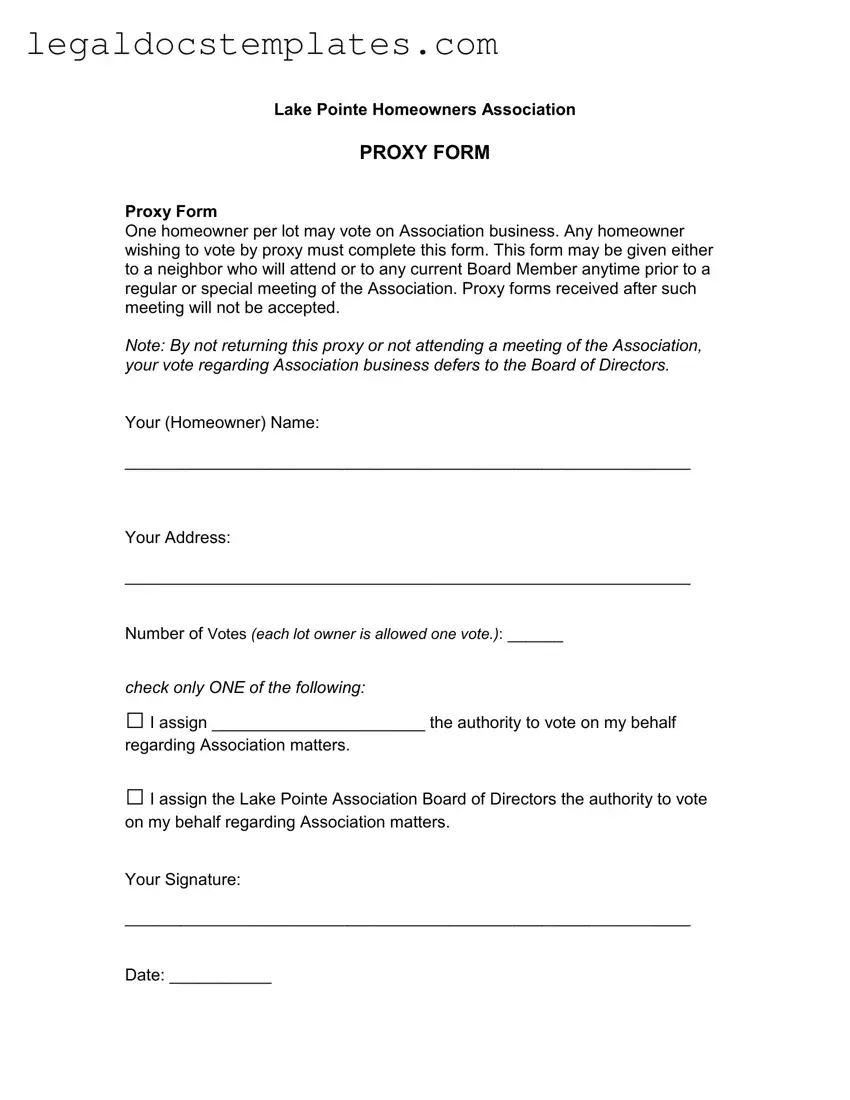A proxy form for a homeowners association is quite similar to a Power of Attorney document. Both serve the purpose of authorizing another party to act on one's behalf in legal or financial matters. In the context of a homeowners association, a proxy allows another individual or the board of directors to vote on association business for a homeowner. Similarly, a Power of Attorney can grant someone the authority to make broad or specific decisions, which might include handling financial transactions or making healthcare decisions, depending on the powers granted.
Another similar document is a corporate proxy form, often used in the context of shareholder meetings. Like the homeowners association proxy, this form allows a shareholder to appoint someone else to vote on their behalf at a corporate meeting. The key similarity is in delegating voting rights to another party, ensuring the shareholder's interests are represented even in their absence. This mechanism is crucial for both corporate and association governance, facilitating decision-making processes when direct participation isn't possible.
The absentee ballot used in governmental elections shares some similarities with a homeowners association proxy form as well. Both enable a person to vote without being physically present, ensuring that individual's voice is heard on important issues or elections. While an absentee ballot directly records an individual's vote on specific issues or candidates, a proxy in a homeowners association context authorizes another to vote on a range of association matters on their behalf.
Medical consent forms are also analogous, particularly in how they delegate decision-making authority. In healthcare, a medical consent form could allow someone to make medical decisions for another under certain conditions. Similarly, a homeowners association proxy gives someone else the authority to make decisions about association matters. Both types of documents are essential for ensuring that decisions can be made when the principal party is unavailable to make those decisions personally.
Voting trust agreements found in corporate law bear resemblance to homeowners association proxy forms too. In a voting trust agreement, shareholders transfer their stock shares to a trustee, who then votes on corporate matters on their behalf. This arrangement, like a homeowners association proxy, centers around the delegation of voting rights to ensure representation and participation in important decisions without necessitating the direct involvement of all entitled to vote.
Agency agreements establish a principal-agent relationship, wherein the agent is authorized to perform certain actions on behalf of the principal. This concept is closely related to the function of a homeowners association proxy; both involve one party authorizing another to act in their stead for specified purposes. Whether it's conducting transactions, making decisions, or voting on matters of significance, these documents lay the foundation for delegated authority.
Finally, letters of authorization, often used in various personal and business situations to grant permissions or authorize actions, have parallels to homeowners association proxy forms. Whether it’s collecting documents, conducting transactions, or making specific requests, a letter of authorization and a homeowners association proxy both serve the essential function of officially delegating one's authority to another party in one's absence.

